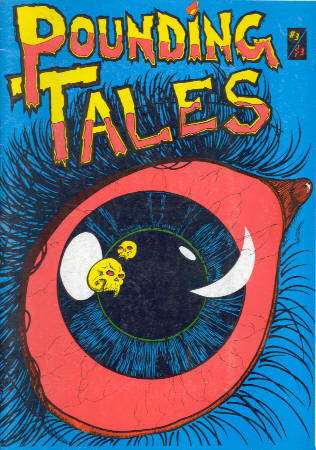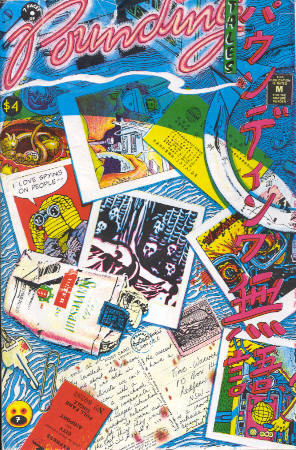Australian Comics
COVER GALLERY
A History of the scene
Adventures of Andy in Comicland
Tale-Trader The Legend of Twarin
The Tiger Who Wanted to be Human
INTERVIEWS
Miles Ferguson
REVIEWS
OTHER
Hellblazers Delano and Ennis
Pounding Tales
An interview with Miles Ferguson
by David Carroll, 1989.
Author's note: Yes, you read that date right. Back in the late 80s I was writing various strange things for the University of Technology's paper, Newswit, mostly reviews of comics and SF books. It was a bit of a fraught relationship, and this article exemplifies that -- my editor cut its length by about a third, and then put 3" margins around it for no apparent reason (at least my name was misspelt in an interesting way this time). I have now lost the original (which contained rather more details about Pounding Tales, if I remember rightly), which is entirely my own fault, but this should be of enough interest to present in its published form.
 OK, we are know about the situation with Australian comics -- it's not the most secure industry in the world, fuelled more by enthusiasm than profit margins. Well, recently I was able to escape the Tower lifts long enough to wander down to the Half-a-Cow bookshop on Glebe point Road for a talk with Miles Ferguson, the definitely enthusiastic publisher of Pounding Tales Comics. And while this collection of short works may not be to everybody's taste, you could do much worse than having a look at it, and support your friendly neighbourhood industry at the same time.
OK, we are know about the situation with Australian comics -- it's not the most secure industry in the world, fuelled more by enthusiasm than profit margins. Well, recently I was able to escape the Tower lifts long enough to wander down to the Half-a-Cow bookshop on Glebe point Road for a talk with Miles Ferguson, the definitely enthusiastic publisher of Pounding Tales Comics. And while this collection of short works may not be to everybody's taste, you could do much worse than having a look at it, and support your friendly neighbourhood industry at the same time.
Tabula Rasa: We'll just start by asking you about yourself and how you got into comics.
Miles Ferguson: Ever since I was a child I've been right into comics. I used to read all the Dandys and Beanos, Cor and Whizzer'n'Chips, and that. Pounding Tales started out as a Christmas present from a friend who gave me a comic of a trip we went on together. It was wintertime, and we had nothing else to do, so we sat around drawing comics, and as we were drawing, friends would come in, start drawing themselves, and say, "oh yeah, we can do this". Then we collected all the strips together and put it in a pamphlet that was Pounding Tales #1. We applied for a Government grant for $2000 and that was Pounding Tales #2. That came out with the flexi-disc of the Plunderers and the Creeps. I moved up to Sydney from Canberra during the making of #2, and from then on it just took off. We just went for it. Though now of the original lot there's only me and one other guy who still do stuff.
TR: What is your actual role?
MF: Editor, publisher, writer, collator... hassler. Do the distribution and that sort of thing.
TR: Who do you aim the comics at?
MF: Good question. We don't actually know who is out there. On the staff we've got an art student, a guy who writes scripts professionally, a guy who's a historical librarian, a professional illustrator, a couple of unemployed people, one guy who just wants to crack into comics, and plays in bands around the place -- it's really a big cross-section. Because we've all been interested in comics, we've just been putting it out, and only in the last couple of issues have we really had any editorial direction. Now that we've got so much material, we can choose and start to format. We still don't know who we're aiming at but, I suppose, people who like something different. It's got a sort of post-apocalyptic feel about it. A lot of destruction goes on.
TR: What sort of competition are you up against in the Australian scene?
MF: There's none, really. All the comics people do in Australia are all so different. I don't think it's a matter of competition, because there's a lot of people who buy comics, and there's not that much local content around. I think the more comics produced the better for everybody else. For example, there's a new one on the market called Drawing Away, which is an all-women's comic. I've seen the first two issues and they're pretty good, though they're asking for contributors. Then there's Cyclone, which I think has folded now, which was basically doing a superhero-type thing. They entered it solely on a business level and thought "what's going to sell?". So they went ahead and churned it out, which was fair enough and they probably made money out of it. But now these guy's are working for Marvel or DC -- one of them is inking for Aquaman or something. That's not the primary interest of it -- to make money. It's our art form. It's the way we express ourselves. We've always been comic fans and it's what we like comics to be. We're getting better at it. I'm not saying that we're real shit-hot or anything like that, but we're certainly getting better at it.
 TR: What sort of success are you having? Do you think you'll be able to continue?
TR: What sort of success are you having? Do you think you'll be able to continue?
MF: Yeah, well, we've never ever made a profit, and we're already up to issue 7, so we imagine we'll keep going. What we're waiting for is a break like Fox Comics. They're another Australian anthology comic who got with Fantagraphics and went to America. I was actually off to the States, and the week before I left I cancelled my ticket and bought into the Half-a-Cow bookshop. It was really good for Fox to get the Fantagraphics deal, but I could almost tell straight from the beginning that they didn't know what they were getting into. We wish them well, but from the latest reports it's not selling that much at the moment. Maybe it's not suited to the Yanks. We'll see.
TR: What sort of comics do you read?
TR: Akira, which is a Japanese comic translated into English, is one of the best ones I've ever seen. Love & Rockets, Neat Stuff, Sinner, Hunt Emerson, I like a lot of the British stuff like Knockabout and of course the underground stuff like Zap and Yahoo. 2000AD I really like as well -- it's short and punchy -- Deadline, and Yummy Fur, that's the best one.
TR: What is your attitude towards the big ones like DC and Marvel?
MF: It's a different cup of tea, really, it's like C-Grade schlocko movies. In any medium you can go from Mills and Boon to Kafka, and they're really at the prostituted end of the market. There's not many DC titles that are much chop. Swamp Thing was one of their best ones and they had to censor one of the guys, Rick Veich, who'd taken over and stopped from doing this particular story. So he just quit and they got these hacks in. Hellblazer's probably the best one, Marvel's Marshal Law -- they're the only ones I read from the majors, but it's all been done before. Marvel's probably even worse than DC. They're really just done the formula into the ground. It's still that sort of "Oh woe, my best friend has left me and I've got to fight the Hydroman", and that's just shit. And all these crossovers, they're just there to get people to buy more comics to get the full story. It's just so blatant it's fucking pathetic. I really admire Fantagraphics. Vortex as well. Mister X is a really good comic. They've probably got the best covers going at the moment.
TR: Are Australians cultivated comic readers?
MF: A lot of countries have a much greater appreciation of them, like Spain. During the Spanish Civil War, when the Fascists were in power, the Resistance was spreading information by just ditching comics off the back of trucks, because half the population was illiterate. The CIA were educating the Contras with comic books.
©2011 Go to top

